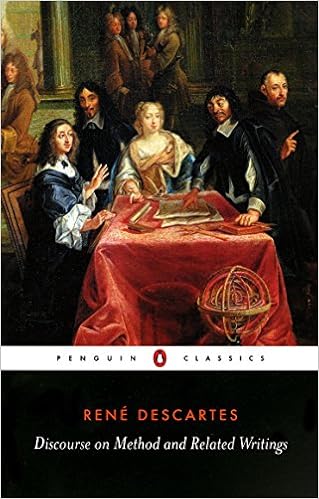
Rene
Descartes was a 17th century writer and philosopher from France. He
attended the Jesuit College of La Flèche and graduated in law at the University
of Poitiers. Descartes is most famously known for his phrase, “I think
therefore I am” or in Latin, “Cogito, ergo
sum”. In his book Discourse on the
Method for Guiding One’s Reason and Searching for the Truth in the Sciences
or simply written Discourse on Method,
René Descartes seeks to instruct the reader on how best to seek and find truth
through the sciences.
The
Discourse on Method itself is rather
brief, but within these pages Descartes makes a claim that has shaped the
course of modern philosophy and sciences forever. Descartes main focus is to explain his own
personal journey on how he came to understand the best way to use his rational
powers. As he himself puts it, “it is not good enough to have a good mind; it
is more important to use it well”[i] His method is what is
referred to as methodical doubt. In other-words Descartes explains that if one is
to find true knowledge they must first do as he did and abandon anything that
may be doubtable in anyway. For Descartes method it was imperative to start at
an epistemological ground zero. In
regards to preparing himself to lay the foundations of his own philosophical
principles he writes: “I had spent a long time preparing myself…by rooting out from
my mind all the incorrect views which I had previously accepted”[ii]. By doing this he was
able to create his philosophical principles which can be summarized by the
following maxims: 1) never accept anything as true unless it is clearly known
to be true; 2) subdivide any problems faced into as many parts as possible in
order to examine them more closely; 3) start with the most simplest objects and
work up towards the most complex and assume order even if none is apparent; 4)
make a comprehensive review and explanation so nothing is left out[iii]. With these rules in
place Descartes set out to seek and find Truth.
What
is most interesting about this book is that he spends a good amount of space
talking about himself and his own personal education. Another interesting aspect
which admittedly surprised me was the fact that Descartes in no way used his
method to try and disprove or even question the existence of God. He even uses St.
Thomas Aquinas’s degrees of goodness to explain the existence and necessity of
God. There are some who would use Descartes method as way to disprove the
existence of God because of its reliance on methodical doubt, but this was
never the intention of the author.
However, Descartes did breakaway from the scholastics of his time by rejecting
the idea that substantial forms can act as explanatory principles in physics, “for instance, the goal of being a swallow is
the cause of the swallow’s ability to fly. Hence, on this account, a swallow
flies for the sake of being a swallow”[iv]. While the above
statement is true about the swallow, it does not give any practical information
about the swallow itself or its flight (or whether it is African or European).
In
his book Method on Discourse,
Descartes does not so much set out to prove something, rather he sets up
guidelines and gives some examples of how he used them to attain a deeper understanding
of the natural world. Descartes moved
away from Aristotelean teleology (a thing does what it does because that is it
s nature) and laid the foundation by which the seeds of modern philosophy and the
modern sciences could grow and flourish. While this is certainly a good thing,
there are those who have taken Descartes ideas and beliefs to the extreme, and
as result have caused a great rift between the world of science and the world
of faith. After reading Discourse on
Method I do not believe that Descartes intentions were to create a rift
between religion and science but rather to use science to have a deeper and
better understanding of the natural world and perhaps how the order of nature
points to a higher metaphysical and transcendental truth.
[i] René
Descartes, Discourse on Method, (New York: Penguin Books 1999), 5
[ii]
Descartes, 18
[iii] Descartes,
16
[iv] Internet
Encyclopedia of Philosophy, René Descartes, https://www.iep.utm.edu/descarte/

No comments:
Post a Comment